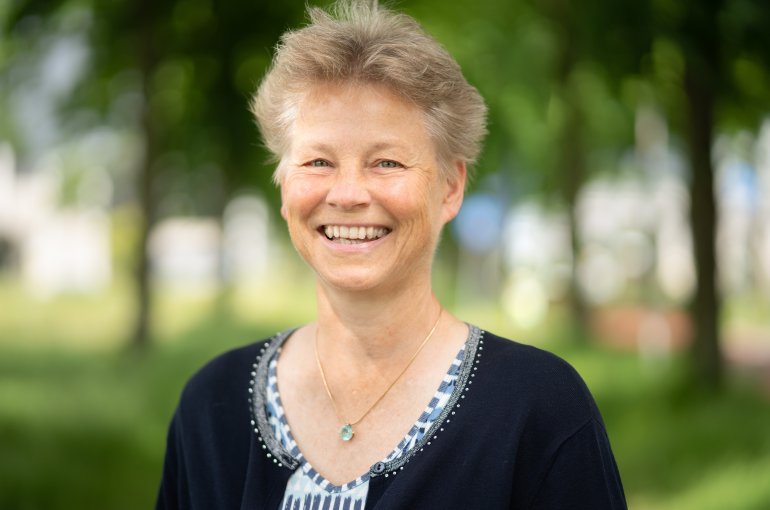Merel Ritskes-Hoitinga new professor of Evidence-Based Transition to Animal-free Innovations
Riskes-Hoitinga focuses on contributing together to the pursuit of an animal-testing-free world

Merel Ritskes-Hoitinga has been appointed professor of Evidence-Based Transition to Animal-free Innovations at Utrecht University’s Faculty of Veterinary Medicine as of 1 June 2022. In her research and teaching, Ritskes-Hoitinga focuses on collaboration between academia, industry and regulatory authorities to jointly produce guidelines and (faster) acceptance of alternatives to animal testing.
In the Netherlands and worldwide there is a clear movement towards animal-free innovations: improving research into medicine, food safety and toxicology without the use of animals. New technologies, such as organs-on-a-chip, artificial intelligence and virtual reality, make this possible. Research and education in these areas are taking off, making the new chair even more relevant.
I want to provide evidence that we can and must accelerate the transition to animal-free innovations
Collaborating with non-governmental organisations
"I want to provide evidence that accelerating the transition to animal-free innovations is possible and must be done," Merel Ritskes-Hoitinga says when asked about her goal with this chair. "That scientific foundation is crucial. But it is just as important that we then actually use these new methods in practice, and that they are accepted by legislative bodies for both humans and animals. This requires transdisciplinary research and education: we must also work with non-governmental organisations in addition to cooperating with other scientific disciplines."
Openness to other forms of research
With the programme Transition to Animal-free Innovation (TPI Utrecht), Utrecht is a frontrunner in the development towards animal-free innovations. What can be done (even) better in Utrecht according to Ritskes-Hoitinga? "It is important to create openness in education for other ways of doing research. For example by asking questions like: how do you formulate the relevant research question? What is already known about the subject? How can you investigate this without animal testing? What steps should I take and who should I involve in this? Not every scientific question requires an animal test. Systematic literature reviews, veterinary patients, stakeholder analyses, interviews and epidemiological data can also provide answers. Fortunately, the SYRCLE centre of expertise will be continued at Utrecht University, offering great opportunities to apply systematic reviews to the challenge of transitioning to animal-free innovations.”
The icing on the cake
"This chair is the icing on the cake for me, the crown on all my work, the circle is complete," Ritskes-Hoitinga says enthusiastically. "I started at the department of Laboratory Animal Science at the faculty of Veterinary Medicine and now I am going to work on animal-free innovations within the same faculty. I am very much looking forward to setting up trans- and interdisciplinary education and research. Action learning – which refers to a continuous cycle of making inventories of hurdles and opportunities, (re)formulating research questions, initiating actions and evaluating those – by lecturers and students together, plays a major role, also because lecturers can learn from students introducing new ideas.”
“In my experience, involving motivated students from various faculties quickly leads to fruitful and stimulating new teaching and research ideas. Therefore, I look forward to tapping into the motivation and potential of students and fellow teachers. In this way, together we can contribute to the pursuit of an animal-testing-free world."
Career
Merel Ritskes-Hoitinga (1960) studied veterinary medicine at Utrecht University and then worked for several years as an animal researcher, aiming to improve both the welfare of animals and the quality of animal research. She obtained her PhD from Utrecht University in 1992 and then worked as department head and Animal Welfare Officer at Unilever Research Laboratory. Between 1996 and 2005 she was Professor of Laboratory Animal Science and Head of the Biomedical Laboratory at the University of Southern Denmark in Odense. From 2005 to 2017 Ritskes-Hoitinga was Professor of Laboratory Animal Science and head of the Central Animal Laboratory of the Radboudumc. In 2006 she founded the 3Rs Research Centre, which later changed to SYRCLE, the SYstematic Review Centre for Laboratory animal Experimentation. In 2017 she became Professor of Evidence-Based Laboratory Animal Science at Radboudumc due to her new focus on preclinical systematic reviews.
Want to know more?
- TPI Utrecht
- Ritskes-Hoitinga recently published a Nature World View on how to speed up the transition to non-animal testing innovations

